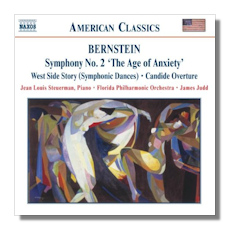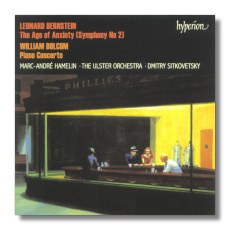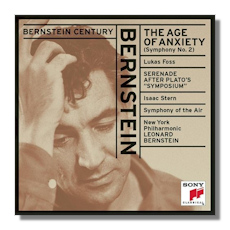
The Internet's Premier Classical Music Source
Related Links
-
Bernstein Reviews
Bolcom Reviews - Latest Reviews
- More Reviews
-
By Composer
-
Collections
DVD & Blu-ray
Books
Concert Reviews
Articles/Interviews
Software
Audio
Search Amazon
Recommended Links
Site News
 CD Review
CD Review
Leonard Bernstein

The Age of Anxiety
- Candide Overture
- West Side Story (Symphonic Dances)
- Symphony #2 "The Age of Anxiety"
Jean Louis Steuerman, piano
Florida Philharmonic Orchestra/James Judd
Naxos 8.559099


- Symphony #2 "The Age of Anxiety"
- William Bolcom: Concerto for Piano & Large Orchestra
Marc-André Hamelin, piano
Ulster Orchestra/Dmitry Sitkovetsky
Hyperion CDA67170


- Symphony #2 "The Age of Anxiety"
- Serenade after Plato's Symposium *
Lucas Foss, piano
* Issac Stern, violin
New York Philharmonic Orchestra/Leonard Bernstein
* Symphony of the Air/Leonard Bernstein
Sony 60558 Mono
I got around to these recordings by the usual route….I was reading Breakfast of Champions and allusions to the poem were made on occasion. This piqued my curiosity so I ordered the book and decided to study the Bernstein Symphony #2 as well. I already had a recording on Naxos that I had dipped into without much of a response on my part. Considering that perhaps I should try another recording I did some research and ordered the Hyperion recording. Still, I wanted to listen to one of Bernstein's recordings so ordered the one on Sony (I find I prefer his earlier recordings to the later ones on DG). While all of the recordings under consideration have additional material I will focus just on the symphony.
A few words about the poem. I'd heard of Auden as an undergraduate majoring in English but never got around to reading anything by him. I came across his name again when it turned out he was Morrie Schwartz's favorite poet (Tuesdays With Morrie). So I considered this part of the project. There are some interesting passages in the poem and the description of the musical movements that parallel the symphony are helpful in better understanding it (in the insert notes, particularly those in the Hyperion release). At the end, however, I felt a bit empty. I had no sympathy for any of the four characters and it taught me nothing about the human condition. Another case of "Great Literature" leaving me cold.
The symphony is more interesting and I found myself noting influences ranging from Copland to Bartók. The final three movements (The Dirge, The Masque, The Epilogue) are particularly involving with the ending having a sense of victory in it that I didn't find in the poem. So, which is the one I will pull off the shelf for a first listen?
An overview of each of the recordings is quickly revealing. There are three main problems with the Naxos disc: the sound, the orchestra and the soloist. The sound is dry with no reverb around it, the soloist tends to pound on the piano and has no feel for the jazzy elements in the music and the orchestra simply is not in the same ball park as the others. The Sony release has better sound but perhaps too manipulated. Solo parts tend to jump out of the orchestra and bury it rather than being part of the whole. Lukas Foss doesn't seem to bring out the jazz elements. He sounds like a classical pianist trying to play jazz. When we come to the Hyperion release we've reached the Goldilocks recording. Everything I found lacking in the first two recordings was here. The sound is rich, a full orchestra, with nice transparency and detail. The pianist has just the right feel and swing. As for the conductors: James Judd is competent but no more; Lenny is oddly not into the music the way I expected him to be (maybe he's rehearsed it to death before the recording?) but Sitkovetsky is the Goldilocks resolution.
The conclusion? I will probably go back and dip into the poem again. I am a bit curious about my initial conclusions about it. As for the symphony, only the Hyperion recording reveals it as a symphony and not just an episodic musical journey.
Copyright © 2014, Robert Stumpf





















